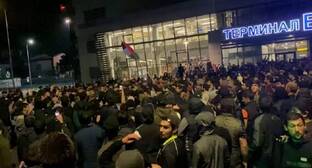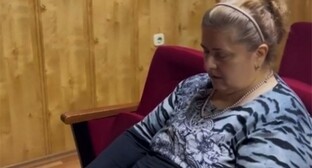19 June 2007, 22:08
Relatives of the militants who perished in Kabardino-Balkaria intend to complain to the European Court
The correspondent of the "Caucasian Knot" was informed about it by Ole Solvang, representative of the organization "Legal Initiative for Russia," who visited Nalchik one of these days. Late in 2005, this organization helped the parents to prepare a complaint to the European Court against the refusal to give out the bodies of perished militants for burial.
Ole Solvang met the parents of the casualties. He told them that, apart from objections to the answers of the Government of Russia, they should write to the Court about their moral sufferings caused by cremation of the bodies of their sons.
Ole Solvang said: "We've received the memorandum of the Government of Russia. Now we have time till July 24 for writing objections thereto. The information from this document that the bodies have been cremated is important.
Our objections will emphasize this particular fact and add it to the already available arguments, and we'll try to prove that this is a very bad way of behaviour, that it is inhuman and breaks the rights of the relatives."
As to the prospects of this case at the European Court, Ole Solvang said that "it is always difficult to forecast anything, but we see here violations of human rights, and we think that the European Court with agree with us." Ole Solvang also added that since return of the bodies is already impossible, the European Court will establish the fact of violations of the rights of the parents and will define the scale of material compensation.
At the same time, the parents wrote to the European Court about what they had felt when learnt about the fact of cremation.
This is what the Kereshev family who lost two sons wrote:
"On June 5, 2007, the news arrived that cremation was made on June 22, 2006. There is no limit to our distress. Our tears never dry out, our souls cry, and our hearts are bleeding. The loss of our sons and impossibility even to bury them are our never healing wound and eternal torment."
Lydia Zhelikhazheva, mother of Alim Zhelikhazhev, wrote about her toils:
"...I still had hopes that I'd be able to bury my son's body. But even this hope had gone, when we received the news that the bodies had been cremated back a year ago. This news was very terrible for me. I think that this is a monstrous injustice in relation to me..."
"When the advocate told us that the bodies of our sons had been cremated, I could not grasp at once what had happened. I watched silently some people cry, others consoling them. My head ached and my feet trembled. I began to fall down. I regained consciousness when the ambulance arrived and I was injected against high tension," Zukhra Guzieva wrote.
Arsen Tukov wrote that, although strange enough, he was not surprised by the news "because we live in an unpredictable country. Violence gives birth to violence. The bayonet is not the best tool to solve the 21st century problems, and one should also know that it is not good to sit on."
Arsen Tukov has also written that the parents' duty before their sons is to prove that through "criminal actions" they had been forced to take weapon. The only reason that they prayed and were Moslems, he thinks.
In Ole Solvang's opinion, the European Court for Human Rights will probably consider the complaint of the parents of the perished militants already before the end of this year.
The "Caucasian Knot" has informed earlier that on October 13, 2005, Nalchik was attacked by more than 200 armed militants. As a result of attack back, 15 peaceful citizens, 35 employees of law enforcement bodies and 92 militants were killed.
The bodies of the latter were not given out for burial according to the Law "On Burial and Funeral Business," which forbids giving out bodies of terrorists and informing relatives about the burial place.
Author: Luiza Orazayeva, CK correspondent




